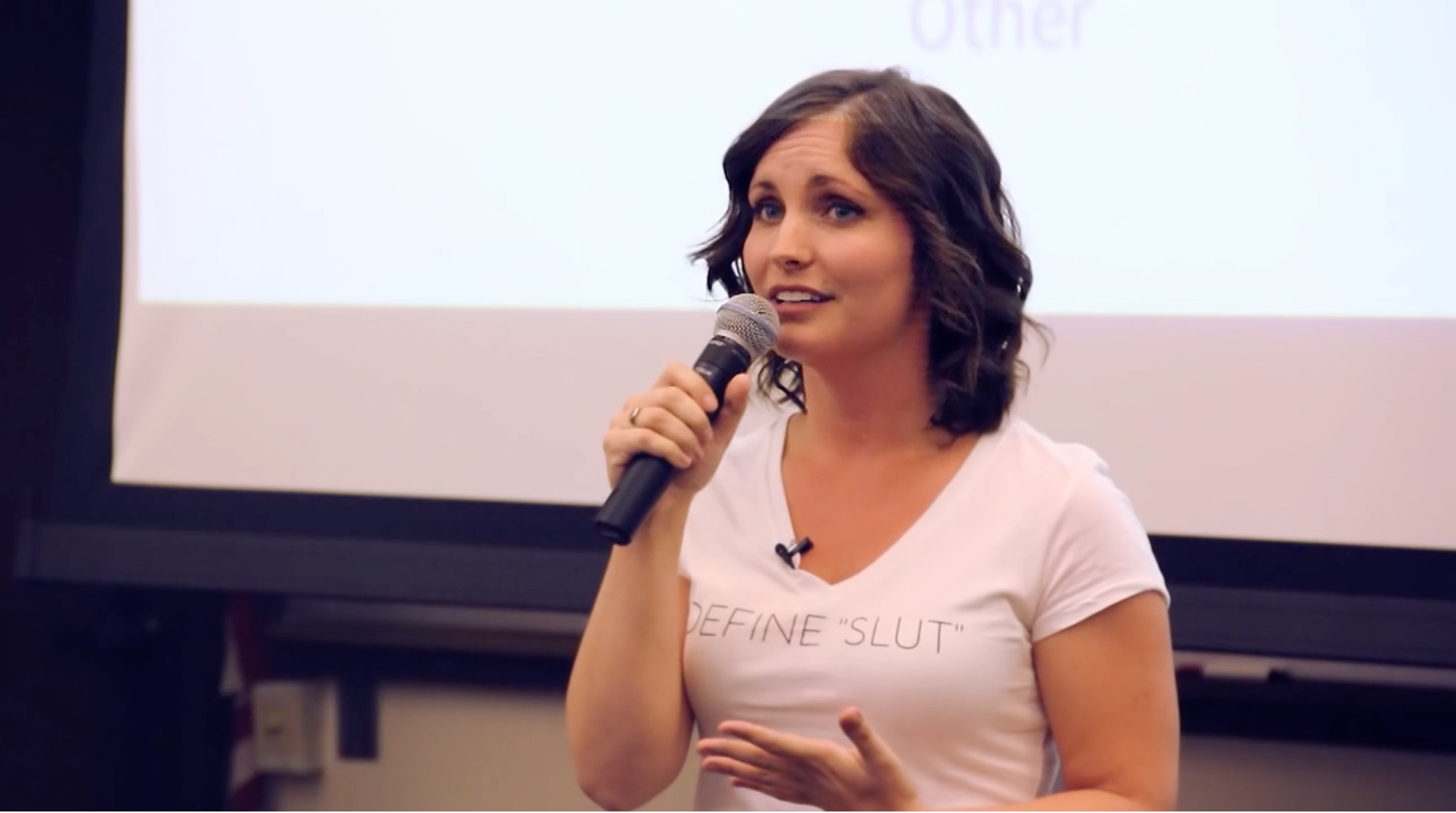The Relationship Between Self-Harm and Slut-Shaming

By:
“Define slut.”
 Emily Lindin - unslutproject.com
Emily Lindin - unslutproject.com
This provocative phrase is emblazoned on t-shirts on Unslut, an online platform for sharing stories and creating awareness about sexual bullying, "slut" shaming, and their negative effects. "There is no definition of 'slut'...the concept of a promiscuous woman falls apart with follow up questions," said Emily Lindin, founder of Unslut told ATTN: during a recent phone conversation. "It's a catch-all insult for women that is really damaging but also telling of our culture and how we treat authentic sexuality."
In 2013, Lindin started the project by sharing her diary from ages 11 to 14 as a way to use her experience being slut-shamed to demonstrate how pervasive and damaging sexual bullying is.
Last year, Lindin published her memoir "Unslut," which includes the diary along with annotations from her adult perspective. While she recently stepped away from Unslut to take on the executive director role at OMGYes, a research-based online resource about women’s pleasure, she spoke with ATTN: about her experiences with slut-shaming and how it can be dangerous for young women to experience.
ATTN: Why did you feel there was a need for a project on slut-shaming?
Emily Lindin: Through this huge ongoing collection, full of diverse voices, it's cathartic for women to type up their experiences and share them, and the main purpose of the project is to reach girls going through something like that right now and to create a sense of solidarity. Women have been through this and survived this, and there might be story here that sounds familiar to you. So you can survive it, too. I didn't expect to use the website this way, but I also use it to demonstrate that this is real to people who question or dismiss women’s shared experience of slut shaming.
 Emily Lindin - unslutproject.com
Emily Lindin - unslutproject.com
ATTN: In hearing all these stories, have you noticed a common thread running through them?
EL: One common thread is that when women have internalized slut shaming and it’s harmed them, there’s a moment when they realize that they don’t need to let other people tell them who they are. Regardless of where you come from, your background, or the support system in your life, there is an extent to which you get to define yourself. While that realization usually doesn’t sink in until you’re past high school or college or into adulthood, that message to young girls usually resonates, because there's no quick fix. Unfortunately, there's nothing you can do to avoid being slut-shamed, because it's not up to you — it's up to the person who decides you've done something out of line with what they think is acceptable.
ATTN: What can girls and other people do to combat a culture of slut-shaming?
EL: So in this world where, unfortunately, you can't do anything to avoid slut-shaming, you can take back control. It's really powerful to know you get to decide who you are and that your peers don't get to decide that for you. The only way to really steel yourself against the world as it is today is to decide that you are a great painter or a pretty good soccer player or a really loyal friend or whatever personality or identity you want to have. We as adults can reinforce this counter-narrative for girls. And they can stand up for each other — girls have the power to not participate in sexual bullying. Making that choice can help anyone down the road, because as girls, there's this constant, looming threat that at any point, you could be labeled a slut and your reputation could be destroyed.
ATTN: Why is slut-shaming is dangerous?
EL: It's dangerous, because it emphasizes the message girls receive from a young age that they are defined by their bodies and by other people's perceptions of their bodies and how they use those bodies. We receive that message from TV shows and other media sources, but also from the adults in our lives, teachers, sex educators whose message is, 'don’t have sex before you’re married or you'll die' — it's everywhere. When that's the underlying situation as girls enter adolescence and you add the sense they are dirty, immoral, and are now in an unacceptable realm of girlhood or womanhood, it can often lead to self-harm, abuse of drugs, violent relationships, or another type of harmful behavior to themselves. It also may lead to suicide attempts, which is why I started the project in the first place. I had considered suicide, then I read about girls who had gone through with it, and I realized the problem hadn't gone away.
It's also dangerous in the ways it overlaps with sexual assault. If you are sexually assaulted, you're very likely to be labeled a slut as if your consensual sexual history justifies that assault. We see it happening in the media all the time — their consensual sexual history is paraded in front of public, and it's as if they're being punished for speaking up for themselves.
Also, after you’ve been labeled a "slut," you're at heightened risk to be sexually assaulted, because in our culture, there's this notion that “sluts” can’t be raped or can’t be sexually assaulted, because they're in a state of always having consented to every sexual activity no matter who it’s coming from. That sounds absurd, but its the way a lot of sexual assaults get justified.
ATTN: From your own experience, what is the relationship between slut-shaming and self-harm? Suicide?
EL: Having attempted suicide and self harmed in middle school and having spoken to girls today, I can see they're two very different things in terms of motivation. Part of the self harm aspect is a desire to gain back control, when you are labeled a "slut," that identity subsumes everything that you are. You can't be both a "slut" and a star athlete. When that is internalized that's all we are, then it's pretty easy to think of yourself as worthless — I'm not anything more than what my peers think I am. When "slut' doesn't make room for how you want to define yourself, self-harm, then, is a way to take back that control through marking your body and regaining a control over your persona.
Self harm is grasping for self control and the narrative around your life, while suicide is a sense of hopelessness and being done with life. Self-harm can also be a way of punishing yourself for being so “slutty” and not living up to the ideal of what you’re supposed to be as a girl. It's common for girls to blame themselves.
ATTN: What's the difference between slut-shaming and sexual bullying? What role do social media and sexting play in them?
EL: I define "slut" shaming as suggesting or saying that a girl or woman should feel guilty or inferior for her real — or perceived — sexual behavior. Sexual bullying, like all bullying, involves a power imbalance, either perceived or real. So they overlap, but they're distinct concepts.
Adults bemoaning social media making bullying worse, but we’ve created this world, these values, and these problems and expect kids to cope with messed up morality. It's unfair to say social media is the problem, but it does magnify the problem. When I was younger, it was easy to escape that bullying at home, but social networks add a layer of media literacy that we need to teach.
With sexting, it's easy to say "don't do it" — that's too simplistic. [That advice] neglects all these constant media messages to be sexy in specific way. Girls perform this ideal “sexiness,” then people turn around and tell them they’re terrible sluts. It sets girls up for humiliation, and in some cases, extortion. Rather than raising girls who can communicate pleasure and authentic sexuality, we're raising girls who are terrified to either become a slut or obsolete. There's no room for defining their own sexuality.
Recent studies reveal why slut-shaming is a real problem that needs attention.
According to a 2014 report by the World Health Organization, suicide is the number one cause of death for adolescent girls ages 15 to 19. In addition to that research, 2013 UK study discovered that childhood bullying directly increases the risk of self-harm in adolescence. Professor Dieter Wolke of the University of Warwick explained:
"It is further evidence for doing away with the myth that bullying at a young age can be viewed as a harmless rite of passage. I’d like to see clinicians routinely asking children about bullying – from name calling to more physical acts of abuse. The importance of this early intervention should not be understated. If we were able to eliminate bullying, while other exposures remained constant, there would be a potential to prevent 20% of all self-harm cases."
